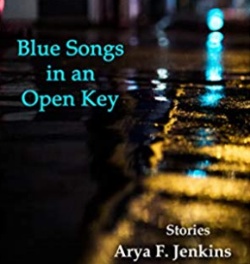“The Piano Whisperer” — a short story by Arya Jenkins
In the underground of how it used to be, in days long ago when things were quite good, when the only bad thing, if you want to call it bad, was poverty, which was longstanding, a dull ache of years that traveled with you through good times and bad and sometimes sang you to sleep like a sad horn, bwa la la la (high note) bwa la la la (high note) bwa la la, in that time, the song of poverty that belonged to everyone belonged also to Noname.
Noname, pronounced Noh-nameh, ran the bleak streets then 60 years ago when the world was kinder, a better place, where murder was just, well, murder, and horror, ordinary, conceivable, and every person, regardless of how they appeared, who they were, part of a diverse evolving unique American gyroscopic system. Even the most jaded soul understood being different was natural, even if your difference was made of so many facets, no one thing stood alone and nothing alone could capture it–save poverty herself, true interpreter of shades and depths of differences, which we celebrated on saxophone streets, in piano bars and when looking to the heavens for inspiration in the form of
...August 14th, 2018


































